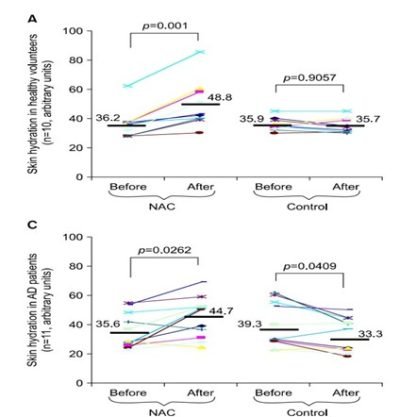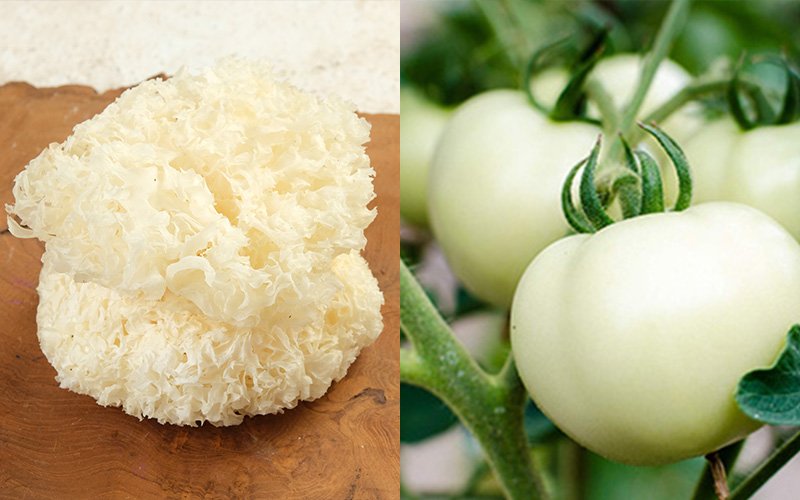Herbasomal Skinboost is a proprietary complex that is encapsulated using liposomal technology, having good bioavailability in renewing, refresh and revitalise one’s skin.
It is an unique blend of natural herbs, comprising of Brussel Sprout Extract, Cucumber Extract, Tremella Extract, White Tomato Extract, Collagen Peptide, Arabic gum, MCT, Glycerol, Sunflower Lecithin, Permitted Food Conditioner.
All the ingredients above are being encapsulated in the liposome to better protect the active ingredients achieving sustained release and promise effective delivery to targeted tissues.
Uniqueness of some of the key herbs in this blend: Figure 1: The effect of Tocotrienol supplementation on melanin level in skin
Figure 1: The effect of Tocotrienol supplementation on melanin level in skin
 Figure 2: The effects of NAC Cysteine supplementation on skin hydration for individuals with Atopic Dermatitis
With the Herbosomal Technology and unique blend, Herbosomal Skinboost offers quality, high bioavailability herbal extracts to effectively improve skin health.
Dose & Application of Herbosomal Skinboost:
3 spoons daily, once or twice daily, preferably with or just after food
Figure 2: The effects of NAC Cysteine supplementation on skin hydration for individuals with Atopic Dermatitis
With the Herbosomal Technology and unique blend, Herbosomal Skinboost offers quality, high bioavailability herbal extracts to effectively improve skin health.
Dose & Application of Herbosomal Skinboost:
3 spoons daily, once or twice daily, preferably with or just after food

Reference:
Uniqueness of some of the key herbs in this blend:
- Brussel sprout: Also known as Brassica Oleracea variety Germmiferra, a native plant to the Mediterranean region. Traditionally used for skin and lifestyle disease management. Brussel sprouts contains a variety of bioactive phytochemicals and is a good source of Vitamin K1.
- Okra: Also known as Abelmoschus Esculentus L., is a native plant to Africa. Traditionally used for control inflammation and aging.
- Tocotrienol oil: Tocotrienol, a component of Vitamin E, is commonly available in palm oil, rice bran etc. Traditionally used for heart health. Proven effectiveness on protecting skin against inflammation and damage from UV exposure as well as melanin accumulation.
 Figure 1: The effect of Tocotrienol supplementation on melanin level in skin
Figure 1: The effect of Tocotrienol supplementation on melanin level in skin
- Carotene oil: As a natural source of Vitamin A, carotene oil is traditionally used for eye and skin health. Regular carotene oil supplementation is proven to be effective in preventing UV-induced skin damage and helps improve skin elasticity.
- Dioscoreae Rhizome: Also known as ‘Shan Yao’, is a native plant to China. Traditionally used for digestive and urinary health. With its variety of bioactive compounds, Dioscoreae Rhizome has good antioxidant, anti-inflammatory and immune-boosting properties.
- NAC Cysteine: NAC Cysteine is the supplement form of cysteine, a natural amino acid. Our body converts cysteine, into glutathione, a very powerful antioxidant.
 Figure 2: The effects of NAC Cysteine supplementation on skin hydration for individuals with Atopic Dermatitis
With the Herbosomal Technology and unique blend, Herbosomal Skinboost offers quality, high bioavailability herbal extracts to effectively improve skin health.
Dose & Application of Herbosomal Skinboost:
3 spoons daily, once or twice daily, preferably with or just after food
Figure 2: The effects of NAC Cysteine supplementation on skin hydration for individuals with Atopic Dermatitis
With the Herbosomal Technology and unique blend, Herbosomal Skinboost offers quality, high bioavailability herbal extracts to effectively improve skin health.
Dose & Application of Herbosomal Skinboost:
3 spoons daily, once or twice daily, preferably with or just after food

Reference:
- Blekkenhorst et al. 2021, “Cruciferous vegetable intake is inversely associated with extensive abdominal aortic calcification in elderly women: a cross-sectional study”, British Journal of Nutrition, vol. 125, pp. 337 – 345
- Adiaha, M.S 2017, “Effect of Okra (Abelmoschus esculentus L. Moench) on Human Development and its Impact on the Economy of Farmers in Obubra Rainforest Zone of Nigeria”, World News of Natural Sciences, vol. 10, pp. 80 – 85
- Neo et al. 2023, “Tocotrienol-Rich Fraction Attenuates Blue Light-Induced Oxidative Stress and Melanogenesis in B16-F1 Melanocytes via Anti-Oxidative and Anti-Tyrosinase Properties”, International Journal of Molecular Science, vol. 24 (20), pp. 1-16
- Balic, A. & Mokos, M. 2019, “Do We Utilize Our Knowledge of the Skin Protective Effects of Carotenoids Enough?”, Antioxidants (Basel), vol. 8(8), 259
- Obidiegwu et al. 2020, “The Dioscorea Genus (Yam)—An Appraisal of Nutritional and Therapeutic Potentials”, Foods, vol. 9 (9), pp. 1-45
- Nakai et al. 2015, “Effects of Topical N-Acetylcysteine on Skin Hydration/Transepidermal Water Loss in Healthy Volunteers and Atopic Dermatitis Patients”, Annals of Dermatology, vol. 27 (4), pp. 450
- Grant et al. 2016, “N-Acetylcysteine in the Treatment of Excoriation Disorder: A Randomized Clinical Trial”, JAMA Psychiatry, vol. 73 (5), pp. 490 – 496
